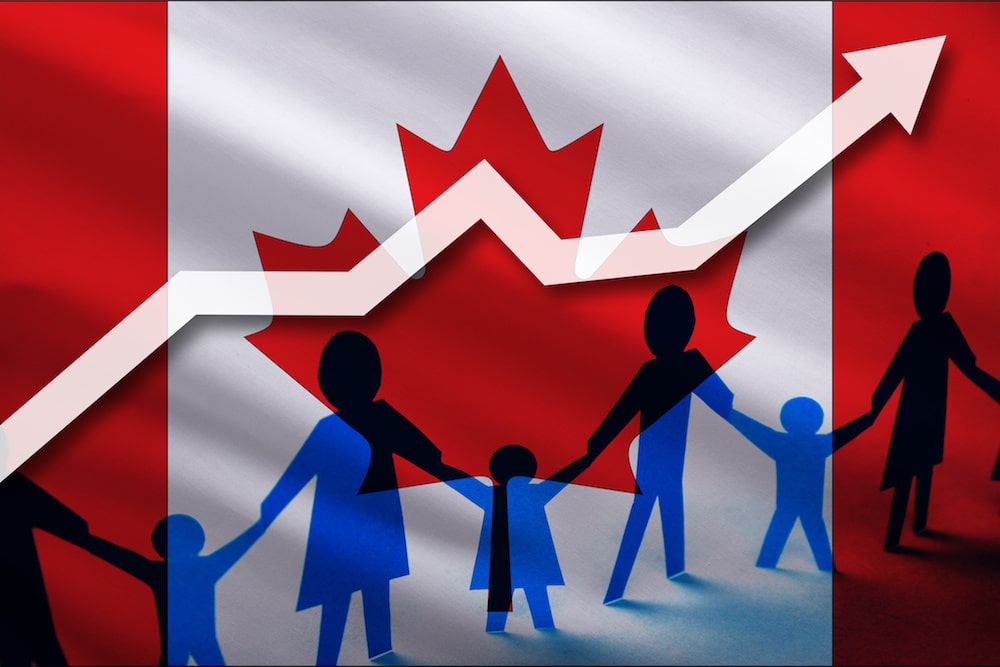Editor’s note: When Brian Graff realized there was no digital version of Walter Gordon’s Whither Canada speech, he used OCR to make it available for Canadians to read on Dominion Review! In this article, Graff provides some key background information and analysis of the speech. You can find the whole revived speech by clicking here.
Whither Canada: Satellite or Independent Nation? (Commentary by Brian Graff)
I am a huge Monty Python fan, and it is hard to fathom that the show premiered 55 years ago, in 1969. The Pythons were all Cambridge or Oxford educated (except for American Terry Gilliam) and so they had a lot of knowledge to draw upon – who else in Canada had seen comedy that combined such silliness with references to Proust or Jean Paul Sartre? Though, U of T graduates Wayne & Shuster did have skits based on Shakespeare.
The Python’s first episode had the title: Whither Canada?
They obviously found discussions about Canada’s fate to be so boring that it would be hilarious to reference them in comedy. It is sort of like how the US New Republic magazine in 1986 posited that the most boring title for any article would be “Worthwhile Canadian Initiative”.
I never knew what inspired the Pythons to think of “Whither Canada” as a title, but while reading I came across a reference to a speech by Walter Gordon titled “Whither Canada: Satellite or Independent Nation?”, given to a seminar for National Federation of Canadian University Students, at the University of British Columbia in August 1960.
Many Canadians are probably unfamiliar with Walter Gordon’s name or reputation. He was a Toronto businessman, part of the Canadian establishment running a large account/management company, who effectively helped ensure Lester Pearson became Liberal leader and then Prime Minister from 1963-8. He is considered the father of Canadian economic nationalism, and chaired the 1957 Royal Commission on Canada’s Economic Prospects, commissioned by Louis St. Laurent but finished when Diefenbaker became Prime Minister in 1957, and its recommendations were ignored. The report questioned Canada’s policy of allowing control of our natural resources and major businesses (and entire industries) to be sold to foreign interests, mainly American, which had accelerated after WWII.
Gordon was not a protectionist (he disliked high tariffs) or totally opposed to free trade, but was concerned about Canada’s future sovereignty and standard of living. He became an MP in 1962, and was Finance Minister from 1963-5, before retiring from politics in 1968. He died in 1987.
Prior to Gordon, the federal Liberal Party had been staunchly pro-free trade with the US, losing elections on the issue in 1891 and 1911. Mackenzie King contemplated another attempt at the end of WW2, but decided against it. Gordon’s influence on the party was a key reason why it commissioned two other reports, the Watkins report in 1968 and the Gray Report in 1972, and implemented nationalistic policies under Pierre Trudeau.
The Liberal Party opposed the 1988 Free Trade deal when John Turner was leader, but that loss saw the party largely retreat from economic nationalism, though Jean Chretien in 1993 expressed some opposition to NAFTA – but did little to act on his concerns once elected.
To show how far the Liberal Party has moved since then: this year, in response to concerns about Canada’s grocery store oligopoly being a factor in food price inflation, the Liberal government indicated it was actively seeking foreign grocery stores to enter the Canadian market (though Walmart and Whole Foods are already here).

I was shocked when I searched the internet for a copy of the “Whither Canada” speech, but found none. I was eventually able to find a copy and scan it, and with the help of OCR, I am thrilled to make it available on the internet for Canadians to read.
A lot has changed since 1960, when Diefenbaker was Prime Minister and Walter Gordon and Lester B. Pearson were rebuilding the Liberal Party.
Pearson had been External Affairs Minister, and a diplomat. Gordon was the key figure in getting the Liberal party to move to the left on expanding the social safety net and other domestic policies.
We now assume that the 1950s and 1960s were years when the economy was fantastic and problems were less challenging than today. The speech is an interesting snapshot of how people felt about it at the time, like in this quote:
“…the threat of serious and possibly chronic unemployment is beginning to frighten and to haunt us. I am not exaggerating. The fact is that when 4.7% of the civilian working force are unemployed and seeking work in July – in the middle of the summer – we can be reasonably certain that the number of people who will be without jobs next winter will be very high indeed.”
Unemployment has not been that low in the last 50 years, though the way we measure it has changed.
Some of the issues raised by Gordon in his speech are relics of the Cold War or that period, such as the issue of whether Canada should have nuclear weapons or not, but he was not averse to Canada playing an active role in global affairs.
Yet, there is a lot of general, practical political advice that still stands up today. Gordon was a pragmatist, and this is reflected in this section – which could apply to almost any nation:
“It follows from what I have been saying that, in considering the pros and cons of any policy proposals, there are two tests above all others that should be kept very much in mind, viz.,
Will the proposed policy result in more jobs and less unemployment?
Will the proposed policy result in a further loss of Canadian independence, or the reverse?”
He provides an even more detailed list, that also still holds up as the factors what should guide Canadian government:
“I am still optimistic about what Canada can accomplish over the long term if we manage our affairs intelligently. What we need, I think, is to agree upon the objectives that Canadians should aim for, and then to develop the policies that we should follow in an effort to achieve them. In thinking about a consistent set of policies, there are of course many different tests or yardsticks against which proposals can be measured. For example,
(1) Will they result in more jobs and less unemployment?
(2) Will they cause inflation?
(3) Will they make a real and substantial contribution to the defence of the Free World or of North America?
(4) Will they result in a further loss of Canadian independence, or the reverse?
(5) Will they benefit the people of Canada as a whole, or just particular groups or classes or sections of the country?
(6) How will they affect personal incomes and the cost of living?
(7) Will they tend to create difficulties for us at some future time?
(8) Will they benefit people in depressed sections of Canada, or people in other countries who are less well off than we are?”
This list still holds up today. Someone might create the same questions for a federal government of today to use as a checklist in both foreign and domestic policy.
We live in a Canada very much influenced by the policies or goals outlined in Gordon’s speech, which shows his progressive social tendencies, such as his praise for the impact of immigrants (from Europe) on Toronto. However, there is no mention of issues like bilingualism, racism, women’s rights/equality and other policies that became prominent in the late 60s or would likely not be omitted in a lengthy political speech today, particularly one given to students.
Gordon was not a socialist or utopian, but he was very concerned about the future and in particular mentions what he thought the Canada of the 1980s should be like. Some of this was achieved by the Pearson and Pierre Trudeau governments, some is still waiting. Despite his usual emphasis on economic issues, his vision of Canada was not entirely about materialism:
“As to national development, I would like to see this country twenty years from now with a population of 27 or 28 million people; with a considerably higher standard of living; with plenty of opportunities available for all who seek to work in a mixed enterprise economy as at present; with a considerable measure of decentralization of day-to-day economic decision-making in the private sector, but with a great deal more of our basic industries in Canadian hands; with a more rounded and complete program of social security benefits; with the responsibilities and the functions and the revenue sources of the provinces and municipalities better defined and more adequate for their needs; with greater cultural and recreational facilities for an urban people who have more free time in which to enjoy a rich and abundant life; and with a better educated people, taking a greater interest in public and community affairs.
I would hope that twenty years from now there may be less emphasis than there is today on material values. I am in favour of competition and I believe in the profit motive – but it should not be the only motive if our objective is a well-balanced, rounded, happy, and at the same time interesting and stimulating life for a people who can be proud of their accomplishments, their independence, and of their influence in the world for good. These are some of the things that seem to me important when we talk about Canadian development.”
But Walter Gordon also looked back at how Canada had developed in past, and the crucial role that government intervention played in ensuring our progress and independence:
“In Canada which is sometimes referred to as an economic anachronism – governments have always played an important and sometimes a dominant role in economic affairs. This has been the case from the beginning, as even a cursory reading of the history of the CPR will show. We have come to accept the concept of public ownership in Canada in certain fields: the CNR, the TCA, the Hydro Commissions of Ontario and Quebec, the CBC, the National Film Board, the PGE, the Canadian Wheat Board, are a few examples of what I mean.”
Yet, since the 1980s, we have gone in the opposite direction, with Petro-Canada being the last major Crown corporation created to play a key role in our economy. Petro-Canada was created in line with this section from Gordon’s speech:
“In the so-called private sector, many of our largest companies which wield a dominating influence in their respective industries are controlled and directed, not by individual Canadians but by people who reside outside our borders. To this extent, Canadians do not make the day-to-day decisions in the economic sphere. Again, this is hardly what we mean when we talk about ‘free enterprise.’ Certainly, it is not ‘free enterprise’ in any national sense insofar as Canadians are concerned.”
Starting with Mulroney, federal (and even provincial) governments have privatized Crown corporations in full or in part, including most on the list in the prior quote. If elected, the Conservatives are threatening to kill the CBC (which was actually created by a Conservative government in the 1930s), and fixing it doesn’t seem to be even an option. The idea of government stewardship through Crown corporations to advance or protect our economy or sovereignty has fallen out of favour and is rarely ever considered, let alone actually done.
Gordon laments in his speech the high number of foreign takeovers and calls for a more “continental” approach. Ironically, this was at the same time that Prime Minister John Diefenbaker was also concerned about Canada becoming too integrated with the US, though he wanted to see Canada strengthen its ties with the United Kingdom instead, an idea that went nowhere.
In a key section, Walter Gordon outlined the risk of going down the road to free trade and the main dilemma (highlighting added):
“The fact is that in recent years, whether we like to admit it or not, Canada has been losing steadily a considerable measure of her independence, both economically and politically. If we are sensible, we should decide either to accelerate the pace of further integration with the United States, politically as well as economically, or alternatively, take steps without delay to reverse the present trend. Either course, in my opinion, would entail difficulties and some unpleasantness. Free trade with the United States on any appreciable scale – even if the Americans were willing to consider this – would bring about a great disruption of Canadian industry and serious unemployment, certainly during an extended period of readjustment and probably for longer. And if this was not accompanied by moves in the direction of some sort of political union or affiliation, we might find ourselves in a very difficult position if, at some later date, some new Administration in the United States decided to abrogate the arrangement.”
This is the situation Canada found itself in when Donald Trump was President and decided to renegotiate NAFTA. Fortunately for us, Trump’s main target was Mexico, but Canada had a very weak position, and walking away from NAFTA/USMCA – and the underlying FTA – were not threats we could make. What is worse, is that Biden has continued to push America First style protectionism, and if Trump wins this November and regains the Presidency, we really could be in deep trouble.
The speech included a warning:
“While a case can be made for either of the courses I have mentioned – faster integration with the United States or the regaining of our independence – I submit that there is no excuse whatever for failing to face up to the dilemma in which we find ourselves today. To do nothing, to refuse to recognize the situation that confronts us or to admit its implications, will lead inevitably to our becoming a more or less helpless satellite of the United States. (The great majority of Canadians might never fully realize just when or how this happened.)”
In effect, by further integration with the United States, we have ended up in exactly this position – though we can probably say when it happened: under Mulroney in 1984-88. Canada is too integrated with the United States to be realistically able to stand on our own, and we are now forced to contend with a dysfunctional American political landscape that makes it hard for us to deal constructively with them to protect our interests, sovereignty and the standard of living we have come to expect.
All content on this website is copyrighted, and cannot be republished or reproduced without permission.
Share this article!




The truth does not fear investigation.
You can help support Dominion Review!
Dominion Review is entirely funded by readers. I am proud to publish hard-hitting columns and in-depth journalism with no paywall, no government grants, and no deference to political correctness and prevailing orthodoxies. If you appreciate this publication and want to help it grow and provide novel and dissenting perspectives to more Canadians, consider subscribing on Patreon for $5/month.
- Riley Donovan, editor